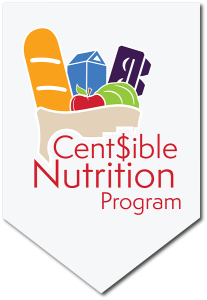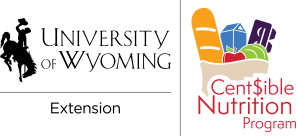Making homemade meals is one of the best things you can do for your health and budget. When you cook at home, you control what goes into your food and your portion sizes. You get to decide what seasonings to use and how much, what type of fat to use (if any), and if sugar and salt are actually needed. Cooking from scratch rather than using pre-made foods lets you control the SoFAS in your diet and it is often less expensive than buying boxed mixes and pre-cooked meals.
Making a menu plan is key to making it easy to cook on any day of the week, even with a busy schedule. This section on kitchen pantries will provide you with additional tools and tips to make homemade meals simple.
Pantry
A well stocked pantry can help make meal planning and cooking faster. You don’t need to buy all of these things at once. Instead, buy a few items at a time, paying attention to sales, and build up your pantry little by little. Below is a list of basic ingredients needed for many of the recipes in the cookbook and that are helpful to have on hand. Also see the CNP Pantry page for recipes to make cooking easier.
Seasonings
Staples
- Basil
- Oregano
- Chili powder
- Cinnamon
- Garlic powder
- Onion powder
- Salt
- Black pepper
- Vanilla extract
- Cocoa powder
- Soy sauce
- Vinegar
- Lemon juice
- Parsley
- Dill
- Thyme
- Rosemary
- Cayenne or crushed red pepper
- Paprika
- Cumin
- All-purpose flour
- Whole-wheat flour
- Sugar
- Brown sugar
- Yeast
- Baking soda
- Baking powder
- Cornmeal
- Canola or olive oil
- Powdered milk
- Bouillon or low-sodium broth
Grains
Fruits & Vegetables
- Whole-wheat pasta
- Brown rice
- Sugar
- Oatmeal
- Whole-grain dry cereal
- Whole-grain dry crackers
- Popcorn kernels
- Whole-wheat bread and/or tortillas
- Fruit jam
- Frozen fruit (no added sugar)
- Canned fruit (in juice or water)
- Applesauce
- Dried fruit
- Fresh seasonal fruit
- Frozen vegetables (without sauce)
- Canned vegetables (low-sodium or no salt added)
- Canned tomatoes
- Potatoes (raw or canned)
- Fresh seasonal vegetables
Protein
Dairy
- Canned and/or dried beans
- Peanut butter
- Canned fish and poultry
- Nuts
- Eggs
- Frozen fish, meat, and poultry (without seasoning or breading)
- Low-fat or fat-free cheese
- Low-fat or fat-free yogurt
- Low-fat or fat-free milk
Staples
- All-purpose flour
- Whole-wheat flour
- Sugar
- Brown sugar
- Yeast
- Baking soda
- Baking powder
- Cornmeal
- Canola or olive oil
- Powdered milk
- Bouillon or low-sodium broth
Seasonings
- Basil
- Oregano
- Chili powder
- Cinnamon
- Garlic powder
- Onion powder
- Salt
- Black pepper
- Vanilla extract
- Cocoa powder
- Soy sauce
- Vinegar
- Lemon juice
- Parsley
- Dill
- Thyme
- Rosemary
- Cayenne or crushed red pepper
- Paprika
- Cumin
Grains
- Whole-wheat pasta
- Brown rice
- Sugar
- Oatmeal
- Whole-grain dry cereal
- Whole-grain dry crackers
- Popcorn kernels
Whole-wheat bread and/or tortillas
Fruits & Vegetables
- Fruit jam
- Frozen fruit (no added sugar)
- Canned fruit (in juice or water)
- Applesauce
- Dried fruit
- Fresh seasonal fruit
- Frozen vegetables (without sauce)
- Canned vegetables (low-sodium or no salt added)
- Canned tomatoes
- Potatoes (raw or canned)
- Fresh seasonal vegetables
Protein
- Canned and/or dried beans
- Peanut butter
- Canned fish and poultry
- Nuts
- Eggs
- Frozen fish, meat, and poultry (without seasoning or breading)
Dairy
- Low-fat or fat-free cheese
- Low-fat or fat-free yogurt
- Low-fat or fat-free milk

